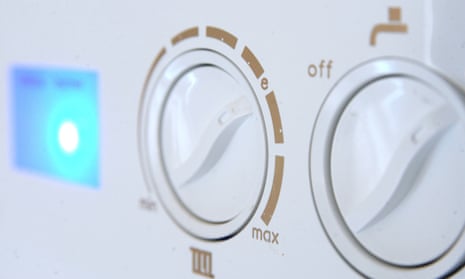The government and sections of UK industry will continue to back the prospect of using hydrogen for home heating, despite a clear verdict against the technology from the UK’s infrastructure watchdog.
The National Infrastructure Commission advised this week, after an exhaustive investigation of the technology, that hydrogen was not suitable for heating homes. The report was unambiguous: “The Commission’s analysis demonstrates that there is no public policy case for hydrogen to be used to heat individual buildings. It should be ruled out as an option to enable an exclusive focus on switching to electrified heat.”
However, the government indicated to the Guardian that it would continue to push hydrogen for home heating, and the body that represents most of the heating industry also vowed to continue to pursue it.
The Department for Energy Security and Net Zero takes the view that the gas network “will always be part of our energy system”, and told the Guardian it would continue to work with the heating industry to explore the potential for hydrogen in home heating.
Mike Foster, the chief executive of the Energy and Utilities Alliance (EUA), which counts boiler manufacturers and gas companies among its members, also sees a future for hydrogen in the home, despite the NIC’s advice, and takes comfort from ministerial assurances. “It’s disappointing to see the NIC wedded to outdated thinking but not a surprise as they have been saying the same thing for years,” he said. “We will need a wide range of technologies to achieve net zero, heat pumps, heat networks and hydrogen boilers. That’s what current government policy states and that’s what we will work towards until told otherwise.”
Foster took aim at heat pumps, despite the NIC’s finding that they were the best and “only viable” option for low-carbon heating for the UK. He said: “It would help sell the case for heat pumps if every member of the NIC gave us their experience of heat pumps in their homes last winter. Real world examples are always a powerful way to influence others to follow suit.”
Hydrogen for home heating also has supporters in key positions in parliament. Sir Robert Goodwill, chair of the environment, food and rural affairs select committee, said: “A typical house gets seven times as much energy through the gas mains as through its electricity connections. If we are going to produce large amounts of renewable energy through offshore wind and also have nuclear energy, we are likely to have surplus off-peak electricity which can be converted to hydrogen. Although that could primarily be used for heavy vehicles where batteries are impractical, there may still be a role for incorporating hydrogen in natural gas supplies, certainly while most houses still have gas boilers.”
The NIC’s verdict on hydrogen came in its regular comprehensive assessment of the UK’s infrastructure. Published every five years, the 222-page document is the result of more than two years of deliberations by engineers and other infrastructure experts.
The reasons it gives for rejecting hydrogen for home heating are manifold. Hydrogen is many times less efficient than heat pumps, and would be much more expensive, according to NIC calculations. “[Hydrogen uses] five to six times more electricity than using the same electricity directly in a heat pump. This is because more energy is lost in converting electricity to hydrogen, and heat pumps use less energy than boilers to produce the same level of heat,” the report found. Heat pumps were suitable for the majority of UK homes, it found.
Scores of independent scientific studies have also found that hydrogen would not be suitable for home heating in the UK, and trials of the technology have failed.
Companies that are pushing hydrogen include those with a strong vested interest in retaining the UK’s gas network. The Guardian and DeSmog, an investigative journalism operation, recently revealed how the EUA, whose members include some companies that are also expanding into heat pumps but whose core existing business is in gas boilers, has lobbied hard against heat pumps.
Some companies are now selling gas boilers as “hydrogen-ready”, in an effort to make their products appear future-proof or low-carbon. This has also been called into question: earlier this week, the Competition and Markets Authority announced it would investigate whether Worcester Bosch, a major UK boiler brand, was “misleading shoppers with confusing or inaccurate green claims” by advertising “hydrogen-blend ready” home boilers.
after newsletter promotion
Upgrading to hydrogen boilers is not an option that any individual household can take alone, as the NIC points out. The safety issues involved with sending hydrogen through gas pipes mean that upgrading any home would require shutting down the existing gas supply for a whole district at a time to ensure the safety of all boilers, including forced entry to any households that had not agreed to comply.
The UK’s gas infrastructure is also likely to require significant and expensive upgrades to take hydrogen safely.
Green experts hailed the NIC report. Juliet Phillips, a senior policy adviser at the E3G thinktank, said: “The shift away from gas boilers means the end of the gas grid as we know it – and those who operate the infrastructure aren’t going down without a fight. Upgrading to clean, electric heat presents an existential threat to their business model and profits. The NIC report has killed off the hydrogen heating pipedream, making clear that swapping fossil gas for hydrogen would be a costly and inefficient solution.”
Phillips added that “genuine concerns” about the job security of people working in fossil fuel supply chains must be addressed, but that “an honest conversation” identifying low-carbon job opportunities and transferable skills and training was the answer.
David Cowdrey, director of external affairs at the MCS Charitable Foundation, which certifies renewable installations, said: “Hydrogen for home heating is a costly chimera, debunked by a wealth of independent scientific research as well as the NIC saying it is just not a solution. The government must not allow the false promises of hydrogen to distract from the true solution of deploying tried and tested, efficient heat pumps at huge scale. It is now time for the government to abandon hydrogen for home heating once and for all, and remove this distraction from the urgent work of electrifying clean heat.”










